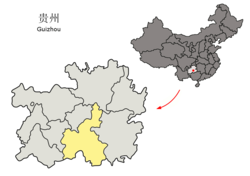Qiannan Buyei and Miao Autonomous Prefecture
This article needs additional citations for verification. (April 2023) |
Qiannan Buyei and Miao Autonomous Prefecture (Chinese: 黔南布依族苗族自治州; pinyin: Qiánnán Bùyīzú Miáozú Zìzhìzhōu; Buyei: Qianfnanf Buxqyaix Buxyeeuz ziqziqzouy; Hmu: Qeef Naif Dol Yat Dol Hmub Zid Zid Zeb) is an autonomous prefecture of Guizhou province, People's Republic of China, bordering Guangxi to the south.[2][3] The prefecture's seat is Duyun, while its area is 26,192 km2 (10,113 sq mi). The name "黔南" derives from the prefecture's south-central location in the province; "黔" is the official abbreviation for Guizhou, while "南" means "south".
Qiannan Prefecture
黔南州 Qianfnanf Zouy Qeenf Naif Zeb | |
|---|---|
黔南布依族苗族自治州 Qianfnanf Buxqyaix ziqziqzouy Qeef Naif Dol Yat Dol Hmub Zid Zid Zeb Qiannan Buyei and Miao Autonomous Prefecture | |
 | |
 Location of Qiannan Prefecture in Guizhou | |
| Coordinates (Qiannan Prefecture government): 26°15′N 107°31′E / 26.25°N 107.52°E | |
| Country | People's Republic of China |
| Province | Guizhou |
| Prefecture seat | Duyun |
| Area | |
• Total | 26,191.79 km2 (10,112.71 sq mi) |
| Population (2010) | |
• Total | 3,232,714 |
| • Density | 120/km2 (320/sq mi) |
| GDP[1] | |
| • Total | CN¥ 159.5 billion US$ 23.1 billion |
| • Per capita | CN¥ 45,654 US$ 6,619 |
| Time zone | UTC+8 (China Standard) |
| Postal code | 558000 |
| Area code | 0854 |
| ISO 3166 code | CN-GZ-27 |
Demographics
editAccording to the 2000 Census, Qiannan Prefecture had 3,569,847 inhabitants with a population density of 136.22 inhabitants/km2; at the 2010 Census, it had 3,232,714 inhabitants.
Ethnic groups in Qiannan, 2000 census
edit| Nationality | Population | Percentage |
|---|---|---|
| Han | 1,548,120 | 43.37% |
| Buyei | 1,158,710 | 32.46% |
| Miao | 477,347 | 13.37% |
| Shui | 286,862 | 8.04% |
| Maonan | 30,958 | 0.87% |
| Zhuang | 13,226 | 0.37% |
| Dong | 11,337 | 0.32% |
| Yao | 11,149 | 0.31% |
| She | 7,130 | 0.2% |
| Yi | 6,927 | 0.19% |
| Tujia | 4,753 | 0.13% |
| Gelao | 3,001 | 0.08% |
| Mulao | 2,223 | 0.06% |
| Hui | 2,116 | 0.06% |
| Others | 5,988 | 0.17% |
Subdivisions
editThe prefecture is subdivided into 12 county-level divisions: 2 county-level cities, 9 counties, and 1 autonomous county.
- County-level cities:
- Duyun City (都匀市)
- Fuquan City (福泉市)
- Counties:
- Guiding County (贵定县)
- Huishui County (惠水县)
- Luodian County (罗甸县)
- Weng'an County (瓮安县)
- Libo County (荔波县)
- Longli County (龙里县)
- Pingtang County (平塘县)
- Changshun County (长顺县)
- Dushan County (独山县)
- Autonomous county:
- Sandu Shui Autonomous County (三都水族自治县)
| Map |
|---|
References
edit- ^ 贵州统计年鉴(2021). 中国统计出版社. ISBN 9787503795558.
- ^ Fang, Chuanglin; Yu, Danlin; Mao, Hanying; Bao, Chao; Huang, Jinchuan (2018-08-21). China's Urban Pattern. Springer. p. 199. ISBN 978-981-10-7694-7.
- ^ Trevaskes, Susan; Nesossi, Elisa; Sapio, Flora; Biddulph, Sarah (2014-07-31). The Politics of Law and Stability in China. Edward Elgar Publishing. p. 28. ISBN 978-1-78347-387-8.